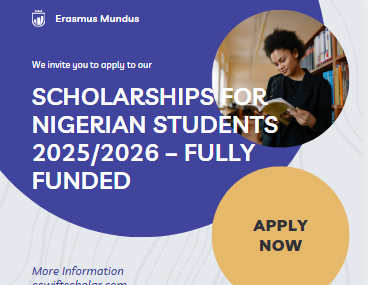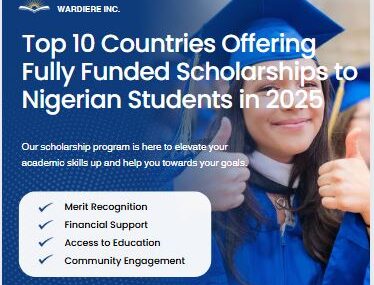How to Get a Fully Funded Scholarship as a Nigerian Student
Studying abroad or at top universities in Nigeria can be expensive, but fully funded scholarships provide a golden opportunity for Nigerian students to achieve their academic dreams without financial burdens. These scholarships cover tuition, accommodation, living expenses, travel costs, and sometimes even stipends for research and books.
However, securing a fully funded scholarship is highly competitive. You need a strong academic background, leadership qualities, and a well-prepared application to increase your chances of success. This guide will walk you through the essential steps, tips, and success stories to help you win a fully funded scholarship as a Nigerian student.
1. Understand the Types of Fully Funded Scholarships Available
Before applying, you need to know the different types of scholarships:
a. Government-Funded Scholarships
- Chevening Scholarship (UK)
- Fulbright Program (USA)
- Erasmus Mundus Joint Masters (Europe)
- DAAD Scholarships (Germany)
- Australia Awards Scholarships
b. University-Sponsored Scholarships
- Oxford University Clarendon Fund (UK)
- Harvard University Scholarships (USA)
- McGill University Mastercard Scholars (Canada)
c. Organization-Based Scholarships
- Mastercard Foundation Scholars Program
- Joint Japan/World Bank Graduate Scholarship
- Rotary Foundation Global Grants
2. Start Early and Plan Ahead
Many students miss scholarship opportunities because they fail to prepare in advance. Some key steps to take at least a year before applying:
- Research and shortlist scholarships that fit your field of study
- Check eligibility requirements to ensure you meet them
- Prepare your academic transcripts, certificates, and CV
- Improve your English skills (TOEFL or IELTS if required)
- Start writing a compelling personal statement
3. Maintain a Strong Academic Record
Most fully funded scholarships require students to have excellent academic performance. Here’s how to improve your academic standing:
- Aim for at least a Second-Class Upper (2:1) or First-Class degree
- Take extra courses or certification programs to strengthen your CV
- Participate in research projects and extracurricular activities
4. Craft a Compelling Personal Statement
A well-written personal statement (also called a motivation letter) is crucial to standing out. Key elements include:
- Your academic background and achievements
- Why you chose the specific field of study
- Your future career goals and how the scholarship will help
- Your leadership skills and community service experience
5. Obtain Strong Letters of Recommendation
Most scholarships require two or three recommendation letters from teachers, professors, or employers. Choose referees who can:
- Speak about your academic excellence
- Highlight your leadership potential
- Provide examples of your work ethic and achievements
6. Apply to Multiple Scholarships
Never put all your hopes on just one scholarship. Apply for as many as possible to increase your chances of success. Some Nigerian students apply for 10 or more scholarships before winning one.
7. Prepare for Scholarship Interviews
Some scholarships, such as Chevening and Fulbright, require interviews. Tips to succeed:
- Research common scholarship interview questions
- Practice answering questions confidently
- Explain your academic and career goals clearly
- Demonstrate leadership and problem-solving skills
8. Follow Up and Stay Persistent
Many students get discouraged after a rejection. But even if you fail in one application, do not give up. Some students apply multiple times before finally winning a scholarship.
Success Stories: Nigerians Who Won Fully Funded Scholarships
1. Bolu A. – Chevening Scholar (UK)
“I applied for the Chevening Scholarship twice before winning. Today, I have a master’s degree in Public Policy from the University of Oxford.”
2. Chinwe E. – Fulbright Scholar (USA)
“Coming from a low-income family, I never thought I could study abroad. Fulbright gave me a chance, and now I work with an international organization in Washington, D.C.”
3. Ifeanyi M. – DAAD Scholar (Germany)
“I studied Biomedical Engineering in Germany through DAAD. Today, I am contributing to Nigeria’s healthcare sector.”
4. Mary O. – Erasmus Mundus Scholar (Europe)
“Thanks to Erasmus Mundus, I studied in Spain and France for free. Now, I work for a global NGO.”
5. Emeka K. – Mastercard Foundation Scholar (Canada)
“With Mastercard’s support, I earned my degree in Canada and started a business to help young Nigerian entrepreneurs.”
6. Ada N. – Australia Awards Scholar (Australia)
“I studied Public Health in Australia and returned to Nigeria to implement community healthcare projects.”
Final Thoughts
Winning a fully funded scholarship as a Nigerian student requires dedication, preparation, and persistence. By following these steps, you increase your chances of securing an international scholarship that will allow you to study abroad for free.
Start researching and applying today – your dream scholarship is within reach!






